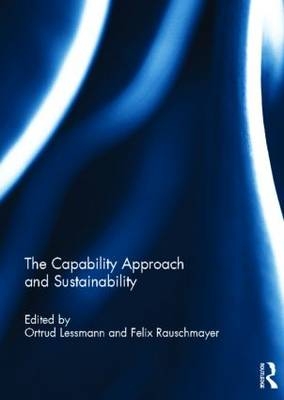
The Capability Approach and Sustainability
Routledge (Verlag)
978-0-415-71253-8 (ISBN)
This book was published as a special issue of the Journal of Human Development and Capabilities.
This is the first book dedicated exclusively to the question of the relationships between sustainability and the capability approach. It is rather astonishing that the issue of sustainability first posed by the Brundtland commission in 1987 has gained so little attention from capability scholars despite the approach’s focus on human well-being. This book starts with a seminal contribution by Sen on the "Ends and Means of Sustainability" delivered as a keynote in 2000. All contributions to the book focus on the difficulties that arise from a freedom-oriented view of sustainability: they argue for taking note of the impact of human life on nature, they question the meaning of intergenerational justice when measured in the currency of "substantive freedoms" (capabilities), they raise the issue of collective responsibility and suggest ways to model and operationalize the capability approach to sustainable development. The book presents the state of the art concerning "The capability approach and sustainability" while admitting that it is only a first contribution to a growing field that deserves our attention: Defining what is to be sustained and asking how it can be sustained.
This book was published as a special issue of the Journal of Human Development and Capabilities.
Ortrud Lessmann is a senior researcher at the Helmut-Schmidt-University Hamburg. An economist by training, her research interest lies in the overlap of economics, philosophy, philosophy of education and sociology. Currently she is conducting a research project on the conception of justice and sustainability on the basis of the Capability Approach. Felix Rauschmayer leads the research field of sustainability policy at the Department for Environmental Politics at the Helmholtz-Centre for Environmental Research, Leipzig. An Ecological Economist by training, his research interest lies in the construction of interdisciplinary models for transdisciplinary research in different fields of relevance to sustainability transitions.
1. The Capability Approach and Sustainability Felix Rauschmayer and Ortrud Lessmann 2. The Ends and Means of Sustainability Amartya Sen 3. Nussbaum’s Capability Approach and Future Generations Krushil Watene 4. Sustainable Development: Does the Capability Approach have Anything to Offer? Outlining a Legitimate Freedom Approach Andrew Crabtree 5. Putting Sustainability into Sustainable Human Development Wouter Peeters, Jo Dirix and Sigrid Sterckx 6. Sustainable Human Development and the Capability Approach: Integrating Environment, Responsibility and Collective Agency Jérôme Pelenc, Minkieba Kevin Lompo, Jérôme Ballet and Jean-Luc Dubois 7. Re-conceptualizing Sustainable Development on the Basis of the Capability Approach: A Model and Its Difficulties Ortrud Lessmann and Felix Rauschmayer 8. A Sustainability-Fitting Interpretation of the Capability Approach: Integrating the Natural Dimension by Employing Feedback Loops Emily Schultz, Marius Christen, Lieske Voget-Kleschin and Paul Burger 9. Studying Well-being and its Environmental Impacts: A Case Study of Minimum Income Receivers in Finland Tuuli Hirvilammi, Senja Laakso, Michael Lettenmeier and Satu Lähteenoja 10. Human Development and Sustainability Eric Neumayer
| Verlagsort | London |
|---|---|
| Sprache | englisch |
| Maße | 174 x 246 mm |
| Gewicht | 453 g |
| Themenwelt | Naturwissenschaften ► Geowissenschaften ► Geografie / Kartografie |
| Sozialwissenschaften ► Soziologie | |
| Technik ► Umwelttechnik / Biotechnologie | |
| Wirtschaft ► Volkswirtschaftslehre | |
| ISBN-10 | 0-415-71253-X / 041571253X |
| ISBN-13 | 978-0-415-71253-8 / 9780415712538 |
| Zustand | Neuware |
| Informationen gemäß Produktsicherheitsverordnung (GPSR) | |
| Haben Sie eine Frage zum Produkt? |
aus dem Bereich


